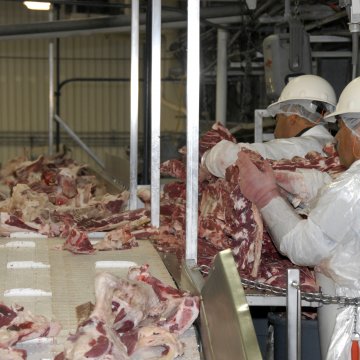Here’s a little quiz: Which meat did U.S. consumers eat the most of in 2022?
U.S. Meat Production Slows as Omicron Hits Staff & Inspectors

Rising COVID infections among U.S. workers have forced meat plants to slow production and the government to replace slaughterhouse inspectors.
Meatpacking, an early epicenter of the pandemic in 2020, is the latest sector to be disrupted by a surge in cases of the highly contagious Omicron variant, which has also left airlines, hospitals, and schools scrambling for staff.
Cargill Inc, a top U.S. beef producer, operated a few plants at a lower slaughtering capacity last week, spokesman Daniel Sullivan said.
Less slaughter capacity reduces U.S. beef supplies at a time of booming demand and means farmers must keep cattle longer in feed yards or on ranches. A sustained period of lower production could further increase high meat prices at a time of inflation fears.
“We are seeing case counts ebb and flow as communities work to manage the spread of COVID, especially the Omicron variant,” Sullivan said.
The U.S. Department of Agriculture estimated beef processors killed 112,000 cattle on Friday, down about 6% from a year earlier and matching January 3rd levels that were the lowest since October. Pig slaughtering, meanwhile, was down about 5% from last year last Friday, according to USDA.
A Cargill beef plant in Dodge City, Kansas, was getting by with a “skeleton crew,” said Lee Reichmuth, a Nebraska cattle feeder and board member for the United States Cattlemen’s Association. The facility supplies beef to retail, foodservice, and processed foods customers domestically and internationally.
“Slaughter’s backing up,” Reichmuth said.
USDA meatpacking inspectors are also increasingly testing positive, said Paula Schelling-Soldner, Chair of the National Joint Council of Food Inspection Locals that represents about 6,400 meat and poultry inspectors.
“The USDA last week shifted inspectors to an American Foods Group beef plant in Green Bay, Wisconsin, allowing cattle slaughtering to continue at the plant that was short-staffed due to infections,” Schelling-Soldner said. “We dealt with this in the beginning of March 2020, where they were just putting the inspectors into these hotspots.”
Chicken company Perdue Farms saw COVID cases rise after the holidays, according to spokeswoman Andrea Staub. She said the increase is “proportional” to communities around its facilities and that Perdue is limiting production of certain products.
Wayne Farms, another chicken processor, said: “Omicron is affecting all types of industries including food production.”
EDITOR’S TAKE:
Not the best news for consumers already concerned about COVID and inflation. The slower lines are problematic for livestock producers wanting to take their animals to market and for consumers who are demanding more product in the stores. Higher meat prices have garnered the attention of elected government officials and the media in recent weeks. I’m sure everyone is hoping that COVID will peak and then decline in the near future. And let’s hope the meat packing lines get back to full capacity soon as well.








